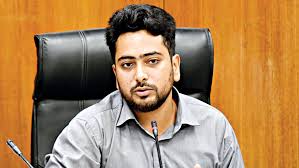
Md Nahid Islam, Adviser for Post, Telecommunication and Information Technology, as well as Information and Broadcasting, has alleged that the country’s political parties are attempting to discredit the interim government, aiming to prove its efforts ineffective.Speaking to a visiting delegation from the British Global Partners Governance (GPG) at the ministry on Wednesday (December 11), Nahidexpressed concerns over political maneuvering and its impact on the nation’s ongoing reform initiatives.“Political parties are prioritising elections over reforms, trying to undermine the interim government to maintain control over the country’s reform agenda,” Nahid said.Nahid highlighted a growing public expectation for the emergence of a new political party following the recent mass uprising that brought the interim government into power. He suggested that if such a party succeeds, it could pose a significant challenge to the country’s existing political structures.
Addressing former Chilean Minister Jorge Jackson’s inquiries about reforms and elections, Nahid described the interim government’s rise to power as unprecedented.
“This is a unique event—a coup driven by a democratic movement. It is not something we’ve seen elsewhere, and we are navigating uncharted territory,” he remarked.
In response to a question from Lord Jeremy Purvis, a former member of the Scottish Parliament, Nahid outlined the primary challenges faced by the interim government: restoring law and order, managing economic instability, advancing reform initiatives through compromises with political parties, and establishing robust global communication channels.
The adviser emphasised the need for international expertise, particularly in democratic transition processes and addressing historical injustices. “Your experience in post-coup democratic processes and trials for genocide is invaluable to us,” Nahid told the delegation, which included representatives like Matt Charter from the Foreign Commonwealth and Development Office.
Nahid pointed out that misinformation and conspiracies, both domestic and international, are challenging the interim government’s legitimacy.
“Many people cannot comprehend how such a powerful dictator fell in such a short time, leading to misunderstandings and false propaganda, including claims about minority oppression. These narratives aim to delegitimize our movement as a democratic coup,” he explained.
He also acknowledged the long-standing human rights crisis in Bangladesh. “For years, people were denied the right to vote, thousands were disappeared, and the nation lived under suffocating conditions. One of our primary goals is to protect and restore human rights,” Nahid affirmed.
The British GPG delegation assured full support for the interim government, led by Nobel laureate Professor Dr Muhammad Yunus, in its efforts to establish stability and democratic governance in Bangladesh.

